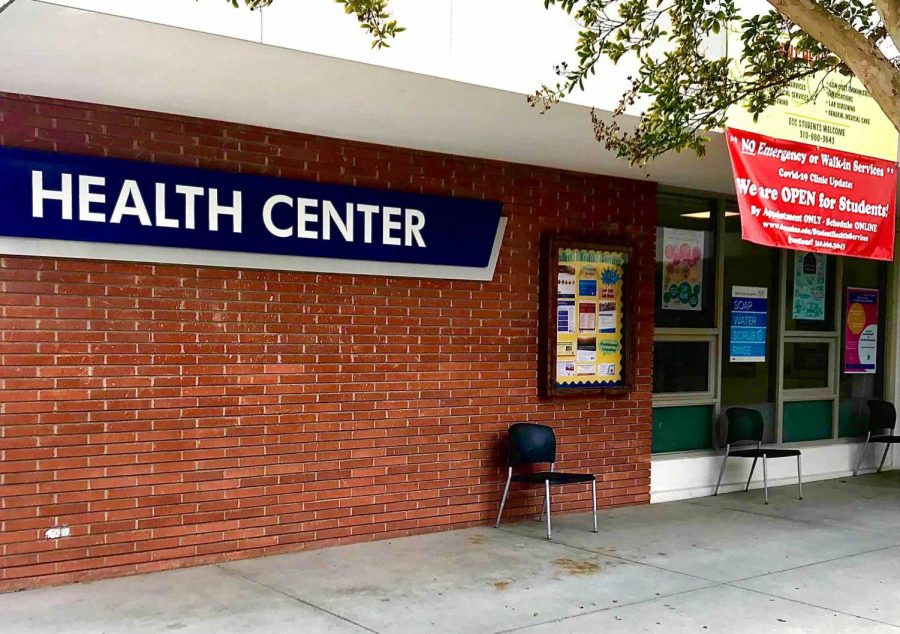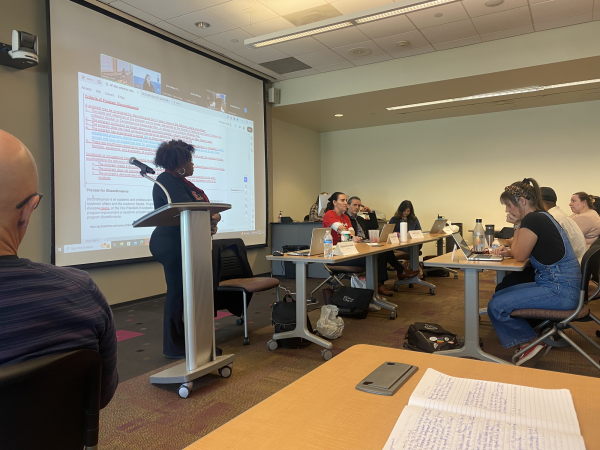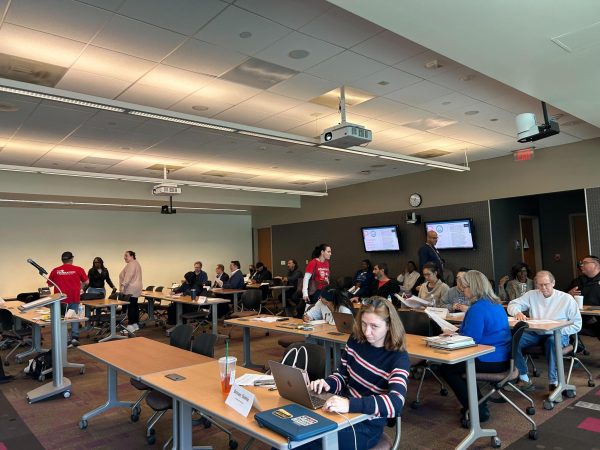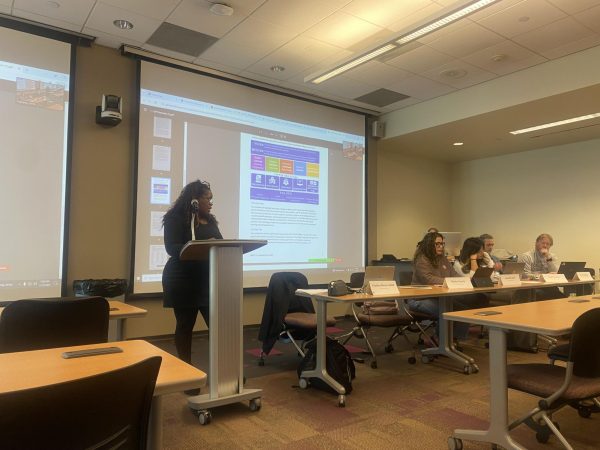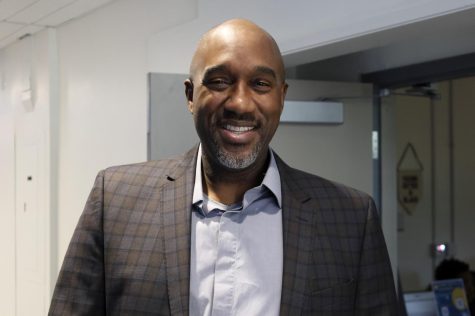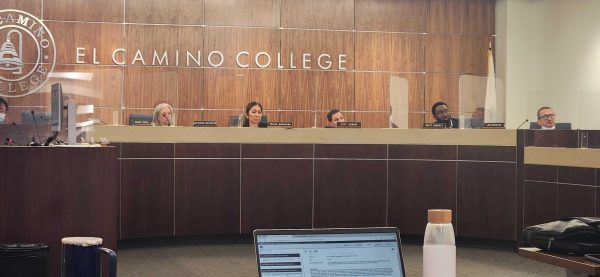El Camino College nursing professor on leave following accusations of gross negligence
A sign that reads “No emergency or walk-in services” hangs above the El Camino College Health Center window on Monday, Oct. 4. Registered nurses who have been hired by El Camino work for the center and try to help students with preventive and physical care they may need. Nicholas Broadhead/The Union
An El Camino College health professor is on leave following accusations of gross negligence and incompetence for the death of a 73-year-old patient he took care of as a nurse in October 2014.
A formal accusation was filed against John Vincent Flynn on May 11 by the California Board of Registered Nursing for an event that occurred when working at Providence Little Company of Mary Medical Center Torrance in 2014.
Flynn was hired as a part-time instructor at El Camino College (ECC) in May 2016, according to a lawsuit deposition, and as a full-time professor in 2017, according to a President’s Newsletter dated Sept. 18, 2017.
Kerri Webb, director of public information and government relations, declined confirmation of Flynn’s hiring during a Zoom meeting that included Vice President of Human Resources Jane Miyashiro.
Flynn was scheduled to teach multiple nursing classes during the spring and fall 2021 semesters but is now placed on leave. It is unknown if this accusation and his leave are related.
Hiring at El Camino College
As for Flynn’s employment at ECC, it’s unknown whether or not he will face any repercussions from the accusation.
“The El Camino Community College District can confirm that Mr. Flynn is currently on leave from El Camino College as a faculty member. The District regrets the tragic loss of life that occurred. As personnel matters are confidential, the District is unable to comment further,” Webb told The Union in an email.
Flynn was hired at ECC despite the 2014 incident occurring before his employment, all while also facing a related lawsuit when he was hired both in 2016 and 2017.
Miyashiro says that when faculty members are hired at ECC, a criminal background check is done.
“For full-time faculty and adjunct recruitments, we don’t do anything but a criminal background check,” Miyashiro said.
Although ECC doesn’t do this background check annually, the college is notified of any criminal cases that occur to a hired individual, but that doesn’t apply to civil cases like lawsuits.
“Their name is placed in a system that gives us updates if they are ever arrested, or there’s a conviction that happens throughout their employment at the college,” Miyashiro said.
Kelsey Iino, faculty union president and full-time ECC counselor, said that information regarding why a faculty member is on leave is confidential. Still, during proceedings regarding employment contract violations, the union would need to be reached out to by the faculty member or human resources to ensure the process is fair.
“They’d have to shoot us an email and tell us, ‘hey, I’m kind of concerned, this is happening to me, what are my rights?’ or ‘I have this meeting coming up, can I have union representation?’” Iino said.
When asked if Flynn reached out to the faculty union, John Baranski, faculty union grievance officer, declined to comment.
Although contact is unknown, Flynn can ask for union representation if a proceeding regarding his leave occurs to make sure the process is fair.
“The union representative there is just to make sure that the district is following the proper procedures. It is also to protect the district because if they don’t follow it properly, then the employee can then come back and sue them for wrongful termination,” Iino said.
Death of a patient
Mansoor Lahiji, the patient Flynn was caring for in 2014, required a feeding tube to gain nutrients while recovering from surgery for subdural hematoma. On the day of his death, the tube was out of place.
Flynn inserted the tube back into Lahiji a total of two times. However, he inserted it into each of Lahiji’s lungs, according to the accusation filed by the Board of Registered Nursing Department of Consumer Affairs.
Due to removing the tube, first by Flynn, then by another nurse after Flynn’s shift ended, Lahiji died due to tension pneumothoraxes, the collapse of both lungs, and pressure onto the heart, according to the accusation.
Arta Lahiji, daughter of Mansoor Lahiji, filed a lawsuit under her mother’s name against Flynn, Providence Little Company of Mary Torrance, and two other physicians for her father’s death in April 2015. She was surprised to read that Flynn was teaching at ECC in his deposition.
“That was so scary to me because one of the most important things that you have to convey to students is that when you don’t know how to do something or you’re not confident in that skill, you have to be humble enough to ask for help from someone who has more expertise, which is licensed or authorized to perform a procedure,” Arta Lahiji said.
Attempts to obtain Flynn’s contact information from his past attorney, as well as contacting multiple phone numbers, his ECC email, mailing a written letter and visiting his address for an interview, were either denied or not answered.
Repercussion of actions
On January 25, 2019 Arta Lahiji, who is a primary care physician, said she filed a nurse complaint against Flynn on the Board of Registered Nursing website, giving them information about the case and what Flynn had done.
“I knew that there was [a process] for doctors, but I actually didn’t know there was a complaint process for the board of nursing,” Arta Lahiji said.
After filing the complaint, an investigator named Autumn Holmes from the board interviewed Arta and her mother, Nahid Lahiji, during the summer of 2019 about what had occurred back in 2014.
“When I got the [lawsuit] verdict results, I sent them to Autumn. In May of 2021, I got that letter that says that they were filing an official accusation,” Arta Lahiji said.
Loretta Melby, a registered nurse and executive officer for the Board of Registered Nursing, filed the accusation against Flynn, requesting the board to suspend or revoke his nursing license, pay investigation costs of the accusation process and face any other actions seen fit for him, according to the accusation document.
Although the Board of Registered Nursing was unable to schedule an interview about the accusation process with The Union, Michelle Cave, a public information officer for the office of public affairs for the California Department of Consumer Affairs, called and emailed The Union.
Flynn had 15 days to file a notice of defense to the deputy attorney general after the accusation from the board was made. An administrative law judge can schedule a settlement conference before an actual hearing and the board can choose to offer a settlement to Flynn, according to an email sent to The Union from Cave.
If an offer is made and Flynn accepts, the settlement will be sent to the board for a vote. If not settled, the case will proceed to a hearing, and the judge will have 30 days to provide the board with a proposed decision that the board will vote on.
The type of punishments Flynn’s license could face is a public document that identifies license reprimands without license restrictions on the license, probation that typically lasts three years, loss of license, or dismissal of the case, according to an email from Cave.
During a phone call with The Union, Cave said for the specific stage Flynn’s accusation is currently in, such as a settlement conference or a hearing, there is no public information available yet.
Cave, however, explained how to find data from the California Department of Consumer Affairs (DCA) on how long it can take for Board of Registered Nursing accusation cases to complete in certain parts of the process.
Complaints like accusations are split into enforcement performance measures, a set of measures that track the efficacy of a complaint process.
Flynn’s case is currently in measure four, titled Formal Discipline, where a settlement conference or a hearing can be held and where discipline and case closures can be decided.
For the Board of Registered Nursing, the target time frame for all parts of the accusation process to conclude is 540 days. Still, during the third quarter of the 2021 standard fiscal year, the average time for a case to close took 748 days, according to the DCA enforcement performance measure data.
With Flynn’s accusation starting back in May, it could be over a year until any information is made public.
Defense during court
Flynn and Providence Little Company of Mary Torrance were unanimously found liable by the jury in the lawsuit for the death of Mansoor Lahiji. In contrast, one of the physicians was found not liable on March 16, 2020, according to the verdict document. The other physician was dropped from the case before it went to trial.
During his deposition process, Flynn said he wasn’t the one who inserted the feeding tubes into Mansoor Lahiji.
According to Flynn’s May 2017 deposition, he said a female nurse was the one who advanced the feeding tube into Mansoor Lahiji each time it had occurred. Flynn says he was in the room holding Mansoor Lahiji’s hands, comforting him.
Nahid Lahiji says this is untrue, as she was with her husband the day of his death and witnessed Flynn himself take out and insert the feeding tubes.
“I heard so many times during the deposition, during the court, and at one point, he said that the second tube was another nurse. He said it was a woman, but that wasn’t true; that was a total lie,” Nahid Lahiji said.
During an investigation on Flynn and his records, it was found that Flynn wasn’t certified to take part in this procedure.
According to a Statement of Deficiencies from the California Department of Public Health, it was found during an unannounced visit to Providence Little Company of Mary Torrance on June 12, 2019, that Flynn wasn’t competent in inserting feeding tubes. It’s unknown if Flynn still works at the hospital today.
“What was grossly negligent in my opinion was the fact [Flynn] decided [to do this] not once, but twice, knowing full well he did not sign off to do this procedure by his mentor, and so that he has this attitude and indifference to human life and the potential impact of his work, then he is potentially teaching students,” Arta Lahiji said.
Because of what was found during the unannounced visit, the hospital had to file a plan of correction to the Los Angeles Department of Public Health, Health Facilities Inspection Division, according to the letter sent by the department to the hospital.
The hospital had 10 days to create and send in their plan of correction to the health department for it to be approved.
According to the correction side of the Statement of Deficiencies, the hospital revised its competency document on feeding tubes. A signature from the nursing leader is needed to make sure that nurses completed the competency assessment. The Nursing Executive Council will also monitor the process.
“Even though my dad’s death was preventable, there is a lot of comfort in knowing that the hospital had to institute changes for patient safety,” Arta Lahiji said.
When The Union called Providence Little Company of Mary Torrance about the lawsuit and Flynn, the hospital declined an interview. Andrew Werts, director of communication for Little Company of Mary Medical Centers Torrance and San Pedro, emailed a statement.
“Providence Little Company of Mary Medical Center Torrance will reserve comment, within the bounds of our commitment to patient privacy and employment privacy laws. Our hospital is committed to excellence and safety and has received top scores for patient safety for the past four years in a row from The Leapfrog Group, a nationally recognized organization.”
Costs of the lawsuit
Although Arta Lahiji and her family were able to receive justice in their lawsuit, she still has uneasy feelings.
“Every validation that we got helped bring peace, but it’s still unsettling that this hospital that plasters a cross everywhere did this to my family and still does not have the grace or humility to issue an apology,” Arta Lahiji said.
Arta Lahiji said she had to pay high costs during the process in order to accomplish this feeling of justice.
“My mom was the plaintiff in all of this. If my mom didn’t have a daughter who earned a doctor’s living, she wouldn’t have obtained this verdict. She wouldn’t have been able to advance $83,000 in costs,” Arta Lahiji said.
The Lahiji’s also never got their full settlement in court because of the Medical Injury Compensation Reform Act of 1975 (MICRA), which limits the amount of money that plaintiffs in lawsuits can get for non-economic damages, also known as pain and suffering.
“It was a law that was made 45 years ago that basically says, ‘we can ignore what the jury said in terms of your families non-economic damages,’ which was $1.5 million, ‘we can ignore what they say and reduce it to $250,000,'” Arta Lahiji said.
Since Mansoor Lahiji was retired at the time of his death and the Lahiji family cannot apply for economic damages, lost work wages if injured or deceased, they could only get non-economic damages and the verdict was lowered.
“We filed this lawsuit knowing full well about the cap, but nothing can describe the sense of justice and closure and peace that came with that verdict,” Arta Lahiji said.
Even though Arta Lahiji didn’t care about the money involved, she can’t help but think of families who can’t afford lawyers and how if they only get $250,000 out of the lawsuit, lawyers that work on a contingency fee basis might not accept the case due to how low the money recovered will be.
“When you have a cap that is so low that people can’t access the judicial system, it’s not even the low money that they are not going to be able to get, they’re not even going to get access to have that closure,” Arta Lahiji said.
Although many events and changes occurred from the death of Mansoor Lahiji, one thing that Arta Lahiji believes should stay the same is the seriousness of learning and working in the medical field.
“As a nursing instructor, you have to teach students to do what you’re only capable of doing because this is not something where the consequences of your errors are inconsequential; the consequences of your errors could mean the difference between life or death,” Arta Lahiji said.
EDITORS NOTE:
Fixed a quote and added information about Arta Lahiji’s occupation for clarity purposes Aug. 27.
A photo was added to the story on Oct. 5 at 10 a.m.



